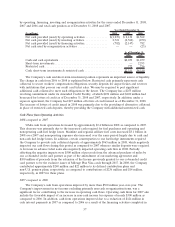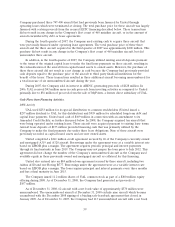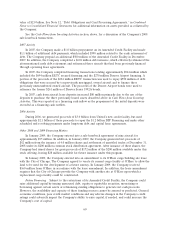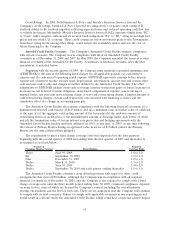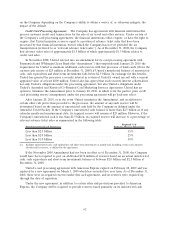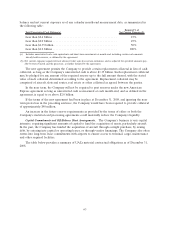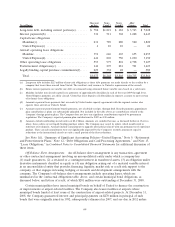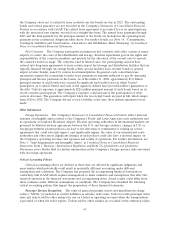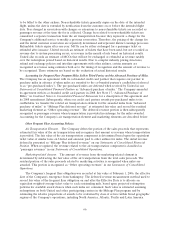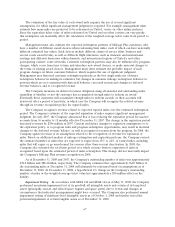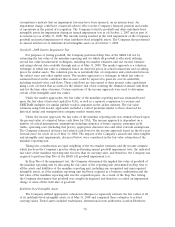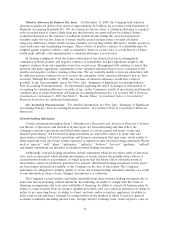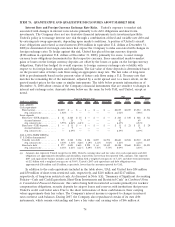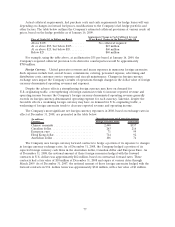United Airlines 2008 Annual Report Download - page 67
Download and view the complete annual report
Please find page 67 of the 2008 United Airlines annual report below. You can navigate through the pages in the report by either clicking on the pages listed below, or by using the keyword search tool below to find specific information within the annual report.The estimation of the fair value of each award mile requires the use of several significant
assumptions, for which significant management judgment is required. For example, management must
estimate how many miles are projected to be redeemed on United, versus on other airline partners.
Since the equivalent ticket value of miles redeemed on United and on other carriers can vary greatly,
this assumption can materially affect the calculation of the weighted-average ticket value from period to
period.
Management must also estimate the expected redemption patterns of Mileage Plus customers, who
have a number of different award choices when redeeming their miles, each of which can have materially
different estimated fair values. Such choices include different classes of service (first, business and
several coach award levels), as well as different flight itineraries, such as domestic and international
routings and different itineraries within domestic and international regions of United’s and other
participating carriers’ route networks. Customer redemption patterns may also be influenced by program
changes, which occur from time to time and introduce new award choices, or make material changes to
the terms of existing award choices. Management must often estimate the probable impact of such
program changes on future customer behavior, which requires the use of significant judgment.
Management uses historical customer redemption patterns as the best single indicator of future
redemption behavior in making its estimates, but changes in customer mileage redemption behavior to
patterns which are not consistent with historical behavior can result in material changes to deferred
revenue balances, and to recognized revenue.
The Company measures its deferred revenue obligation using all awarded and outstanding miles,
regardless of whether or not the customer has accumulated enough miles to redeem an award.
Eventually these customers will accumulate enough miles to redeem awards, or their accounts will
deactivate after a period of inactivity, in which case the Company will recognize the related revenue
through its revenue recognition policy for expired miles.
The Company recognizes revenue related to expected expired miles over the estimated redemption
period. The Company’s estimate of the expected expiration of miles requires significant management
judgment. In early 2007, the Company announced that it was reducing the expiration period for inactive
accounts from 36 months to 18 months effective December 31, 2007. The change in the expiration period
increased revenues by $246 million in 2007. Current and future changes to expiration assumptions or to
the expiration policy, or to program rules and program redemption opportunities, may result in material
changes to the deferred revenue balance, as well as recognized revenues from the program. In 2008, the
Company updated certain of its assumptions related to the recognition of revenue for expiration of
miles. Based on additional analysis of mileage redemption and expiration patterns, the Company revised
the estimated number of miles that are expected to expire from 15% to 24% of earned miles, including
miles that will expire or go unredeemed for reasons other than account deactivation. In 2008, the
Company also extended the total time period over which revenue from its expiration of miles is
recognized based upon the estimated period of miles redemption. This change did not materially impact
the Company’s Mileage Plus revenue recognition in 2008.
As of December 31, 2008 and 2007, the Company’s outstanding number of miles was approximately
478.2 billion and 488.4 billion, respectively. The Company estimates that approximately 362.0 billion of
the outstanding miles at December 31, 2008 will ultimately be redeemed based on assumptions as of
December 31, 2008. At December 31, 2008, a hypothetical 1% change in the Company’s outstanding
number of miles or the weighted-average ticket value has approximately a $50 million effect on the
liability.
Impairment Testing. In accordance with SFAS 142 and SFAS 144 as of May 31, 2008, the Company
performed an interim impairment test of its goodwill, all intangible assets and certain of its long-lived
assets (principally aircraft and related spare engines and spare parts) due to events and changes in
circumstances that indicated an impairment might have occurred. The Company also performed annual
impairment testing of indefinite-lived intangible assets as of October 1, 2008 and further tested the
potential impairment of certain tangible assets as of December 31, 2008.
67


